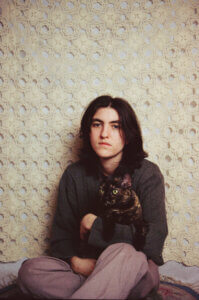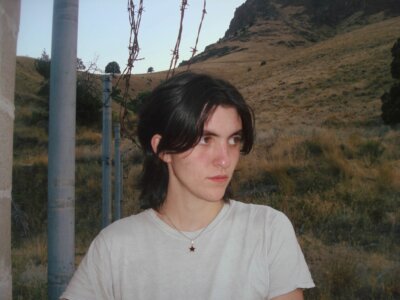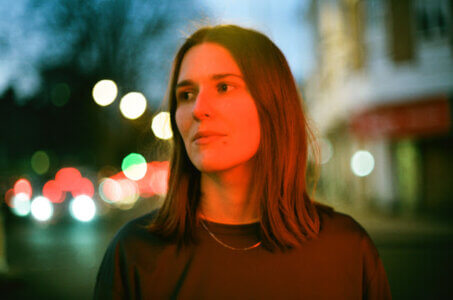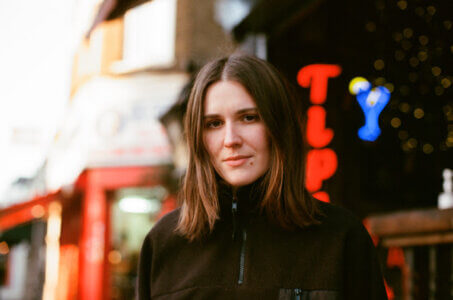Interview with Hugo White of The Maccabees
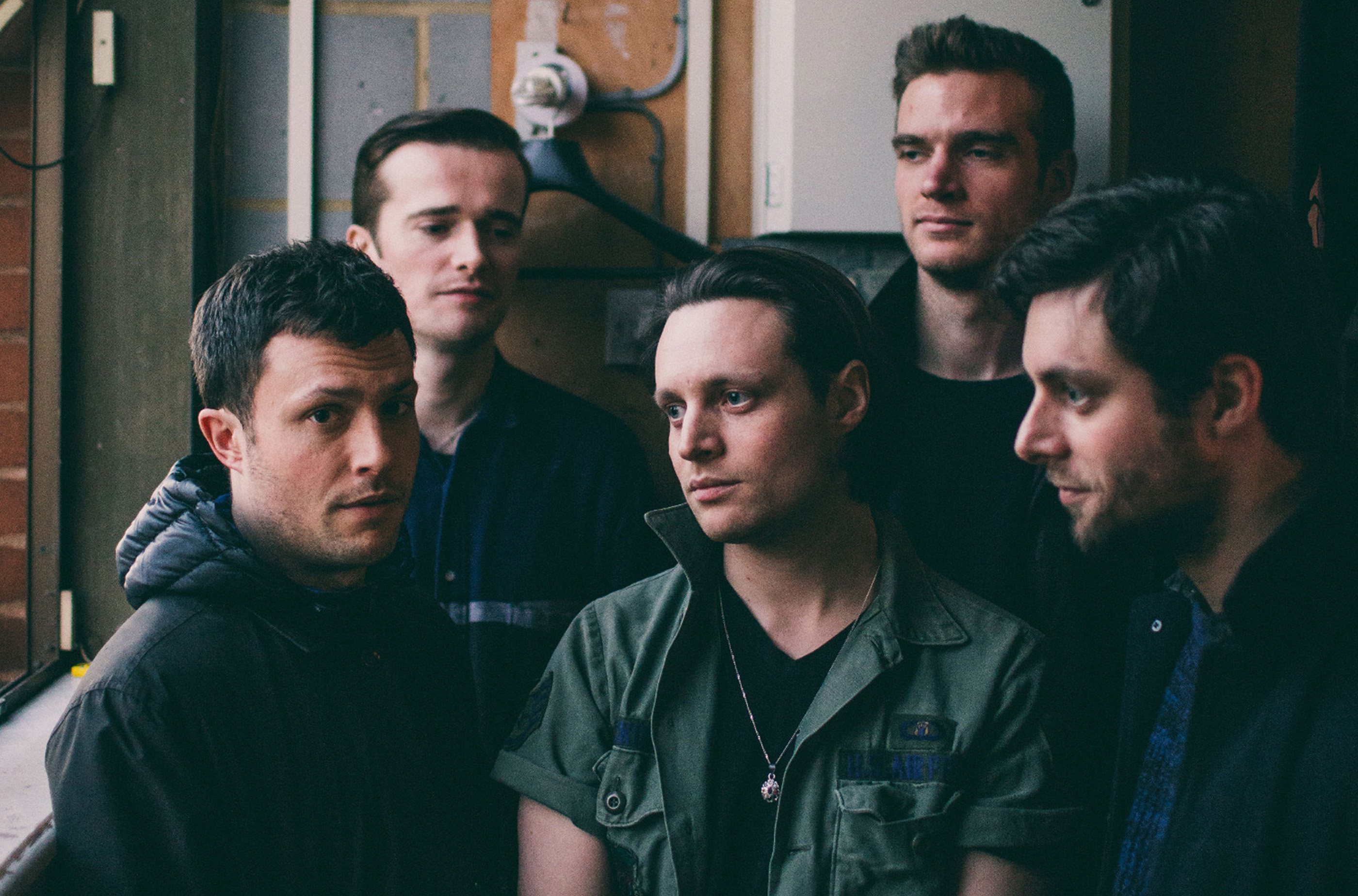
Four days before the release of their record Marks to Prove it, we got 15 minutes to speak with Hugo White of the British band The Maccabees. The band is made out of five members Felix White, Orlando Weeks, Rupert Jarvis, Sam Doyle, and Hugo, who is the producer and guitarist that got to talk with us on the band’s honest intent and work behind new album. Marks To Prove It carries raw instrumentals, from guitar to piano and even brass instruments, to generate a sound that balances with the strong vocals creating the ethereal music on this album. Nova Olson got to talk with Hugo White about what it took to make the album and where the band is headed next.
Northern Transmissions: Hey, how are you?
Hugo: Hello. Yes, I’m well!
NT: Awesome! Where are you right now?
Hugo: I’m in London, sitting at home. Yeah, it’s been pretty busy right now. We are doing lots of things, from promoting the new album and just preparing for its release.
NT: Yeah, because your album is coming out in four days. [July 31]
Hugo: Yeah.
NT: So, I heard that after getting the NME award on your last album ‘Given to the Wild’ and coming back from tour, you got straight into writing this new album ‘Marks To Prove It’. Initially your ideas were kind of scattered but you worked through it, paying every attention to detail, to replicate “these little moments that make up our lives”. So, I guess in finishing the album did you learn anything new about your creative process at all?
Hugo: Um, it’s difficult because I think probably after we finished the last record, it felt like we had solved through our difficulties in writing. We thought we had a better way of working so we finished the tour and went straight into the studio to write for this record. Quite quickly, it unraveled again because we wanted to do something different this time. So, all the things we thought worked, suddenly didn’t work anymore for us because we wanted to do something differently. It did take quite a while to find a new format to work in and I guess towards the end of the process we probably, well, we found a way in which we wanted to do it and which actually I quite love, which came down to not working on computers anymore. Because we had been writing all of our songs there, we used our laptops and to record projects that had lots of layers of things and lots of stuff going on there and actually we found that it was just causing more problems, that was worse. So we put a ban on anyone using the computer to write music. So, everyday we just went into the studio and there would be one microphone in the room and we’d just play all day, the band, in a kind of traditional sense and then at the end of the day kind of highlight a few moments that we had of something good and work through it that way which was new to us because we hadn’t done that since the first album (Colour It In).
NT: Yeah, the first album. That’s when I first heard you guys’ song, “Toothpaste Kisses”.
Hugo: Yeah.
NT: I guess that album compared to this newer album, and I think they both are really good albums!
Hugo: Thank you!
NT: But what would you say is the biggest difference between the two?
Hugo: Well, I think musically they are, the depth of the music, this time round is definitely more intricate than that first record. Although I’d hate to use [the word] it is a more mature record in ways that the first one’s not quite. It was all very new to us so, there’s something great in that but this time there’s a whole lot more detail to what’s going on.
NT: Yeah. Cool
Hugo: Yeah, you know I think the first record was great but, yeah, there’s lots of elements of it that were kinda reminding ourselves of that and I think this record has a few things that we brought back in the way that we used to work as a band on that first record. That, even as a record, it probably has moments where it reflects closer to how we started the band really.
NT: Yeah, I guess that would be kinda refreshing.
Hugo: Yeah, it was quite refreshing at the time and I think we wanted to make a record that could work in a live scenario and really was true to what we were playing in the room. So the songs are kinda true to what we’d do in a live rehearsal. We just wanted to make that in the record, as opposed to just make an album more for the album than it is live.
NT: That’s awesome. And you guys actually got Laurie Latham to come in and help in shaping this album. What kind of experience did he bring that was different?
Hugo: We brought Laurie in and we’d met him not too long before, just through a friend really. I’d produced the record and we knew we weren’t gonna have any out. So, I think that was one of the dangerous things of doing it ourselves. Then we got to a point in the writing where we had so much stuff and we were all beginning to not be able to do it. We’d just be staring at each other all day. Anyway, we decided that we’d ask him to come and sit in while we worked on stuff. So, actually we just gave him a call and he came down for a week or so, and he just sat in the room and actually by him being there. I mean, he’s really got a really good presence about him and he’s very calm and obviously we trusted his musical opinion. So, while we’re working on songs there might be something we didn’t like anymore and he’d say “Well, you know, that seems great. I don’t know why you don’t like it.” And suddenly we’d go “Oh yeah, he’s right, it is great.”
So, you know, he helped us give some perspective, because it gets very claustrophobic when it’s just us in our studio for a month on end. We started going kinda a bit crazy and he came and brought a little bit of, I guess, reality back to the situation. And kinda helped us realized that it wasn’t just a bad situation, that we did have something really great. So he was a real pleasure to have around!
NT: So, I guess now that you guys have finished the album is it how you expected or was it a complete surprise?
Hugo: Well, that depends. Compared to what we would have imagined at the start, I think we didn’t know what it was so, we couldn’t have told you. You know, we were literally sitting in the dark and writing music and trying to find the common ground between us.
NT: Which isn’t always a bad thing.
Hugo: Yeah, not always and we have to do that to find something. We’ve never come up with a concept first, we have to work until the concept appears. Yeah, but I think we’d be really pleased, I mean we are really happy with this record. I think that, if through the kinda darker days of writing, if someone had stated how our efforts turned out, I think we would have been really happy that we would have gotten there. It’s difficult with all the processes and at times you’re just plucking stuff from thin air. You know, it doesn’t exist and you have to create it. It’s a huge amount of work that goes in behind it that has to happen for those ideas to evolve and for those moments to work where everything feels magic. You have to kind of put in the hours to get those moments. They don’t just appear to just come freely.
NT: Yeah, it’s an intense creative process for sure. On your videos, Joe Connor has directed both “Something Like Happiness” and your new released video “Marks to Prove It”, and I hear that they are all a part of a trilogy.
Hugo: Yeah, so the next single is the last one there. I mean, the idea behind them was to kind of- well, they are all filmed in the area around our studio, which is Elephant and Castle -which is in South London. We wanted -which the idea comes from both us and him- to kind of show the three sides of the place, Elephant Castle. We wanted to bring out the different sides of the place so, one of the first videos “Marks to Prove It” shows kind of the chaos and kind of the city hustle. Completely overcrowded and hectic.
NT: Yeah you can imagine anxieties of it.
Hugo: Yeah, and the second video is about the beauty of it and little moments of nature that exist in a very concrete background, kind of highlighting those moments that make them special. Which almost reflects on some of the record, it’s about something that doesn’t seem special on the surface, that wouldn’t grab you unless you kind of look at it. So, when you look twice, you kind of realize, that the thing you walk past every day is actually really beautiful and has as much as a story behind it. It’s just acknowledging those things.
NT: For sure. Would you say it’s important to collaborate with artists in different creative fields?
Hugo: I definitely think so. Even as a band, it’s a collaboration really. We’ve got very different ideas of how to do stuff and so actually working together, as the Maccabee’s is a collaboration in itself. Though I think that working with video directors is always a pleasure. I think it’s the most difficult way to do it is to do it without outside help and because when you bring in something fresh the situation changes. So yeah I think it’s a really good thing! Although we sort of didn’t do it for this record. But it’s definitely a good thing.
NT: I noticed that in some songs on your record there’s a couple trumpet solos I think, who plays that?
Hugo: Yes, there is. We did have some brass band come down to come play that. So, in a few songs there’s just a couple of brass players. It depends what song you’re referring to but there’s probably a trumpet and saxophone at one point and trombone. There’s even a kazoo solo at another point. It’s in the song called “River Song” in the middle of the record and it’s a saxophone and a kazoo, at the same time. [laughs]
NT: Ok, awesome! So, you guys are going on tour, do you have any shows you are excited about?
Hugo: We’ve got some festivals: a couple of festivals in England and a load of European stuff. We are all really excited about it. I think in October we are planning on coming back to North America for a while. So, there is a huge amount of stuff being put into America, so we are really looking forward for that and just to spend time in America.
NT: So, I guess one more question. What are 5 albums you love or are inspired by?
Hugo: I really love this Daniel Lanois album called Flesh and Machine that’s really great.
Jon Hopkins called Immunity.
The Beatles’ White album I’ve been listening to that a lot recently as a record that has lots of sporadic ideas, but somehow they managed to make it work as a whole record and you can list the variety which is what makes it a good record, and I think that was one we used quite a bit as a reference point in times that we thought none of our music made sense.
One of my favourite records is Joni Mitchell Blue
NT: Yeah, it’s great.
Hugo: It’s just a beautiful record, isn’t it? And I think it’s one of those records that you could just always come back to and it just never really ages.
I need one more so I`ll choose Paul Buchanan called Mid Air and he was the singer of a band called the Blue Nile and he released this solo album recently which is just piano and his voice. It was maybe two years ago but it’s the most patient and beautiful. The songs are only two minutes long and it’s just really patient, really delicate and just really beautiful. That’s one of the only records really recently that’s kind of really stuck with me as being magic.
Interview by Nova Olson
A link to the album can be found here.
Latest Reviews
Tracks
Related
Advertisement
Looking for something new to listen to?
Sign up to our all-new newsletter for top-notch reviews, news, videos and playlists.





